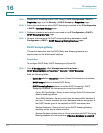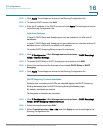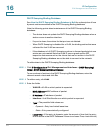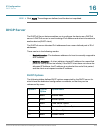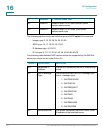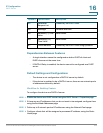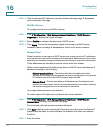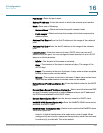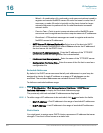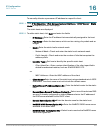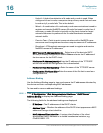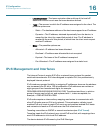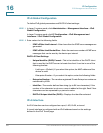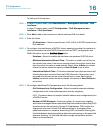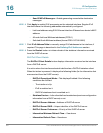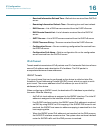
IP Configuration
DHCP Server
281 Cisco Small Business 300 Series Managed Switch Administration Guide
16
- Mixed—A combination of b-node and p-node communications is used to
register and resolve NetBIOS names. M-node first uses b-node; then, if
necessary, p-node. M-node is typically not the best choice for larger
networks because its preference for b-node Broadcasts increases
network traffic.
- Peer-to-Peer—Point-to-point communications with a NetBIOS name
server are used to register and resolve computer names to IP addresses.
- Broadcast—IP Broadcast messages are used to register and resolve
NetBIOS names to IP addresses.
• SNTP Server IP Address (Option 4)— Select one of the device’s SNTP
servers (if already configured) or select Other and enter the IP address of
the time server for the DHCP client.
• File Server IP Address (siaddr)—Enter the IP address of the TFTP/SCP
server from which the configuration file is downloaded.
• File Server Host Name (sname)—Enter the name of the TFTP/SCP server.
• Configuration File Name (file)—Enter the name of the file that is used as a
configuration file.
Excluded Addresses
By default, the DHCP server assumes that all pool addresses in a pool may be
assigned to clients. A single IP address or a range of IP addresses can be
excluded. The excluded addresses are excluded from all DHCP pools.
To define an excluded address range:
STEP 1 Click IP Configuration > IPv4 Management and Interfaces > DHCP Server >
Excluded Addresses to display the Excluded Addresses page.
The previously-defined excluded IP addresses are displayed.
STEP 2 To add a range of IP addresses to be excluded, click Add, and enter the fields:
• Start IP Address—First IP address in the range of excluded IP addresses.
• End IP Address—Last IP address in the range of excluded IP addresses.
Static Hosts
You might want to assign some DHCP clients a permanent IP address that never
changes. This client is then known as a static host.



